|
|
The
Donald
McGill Museum, Ryde,
Isle of Wight. The Saucy Seaside Postcards of Donald McGill.
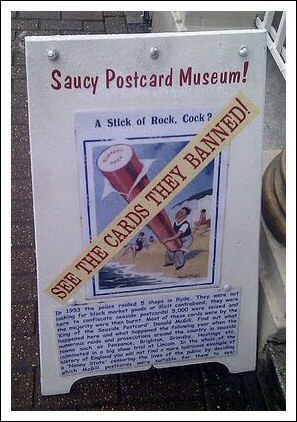
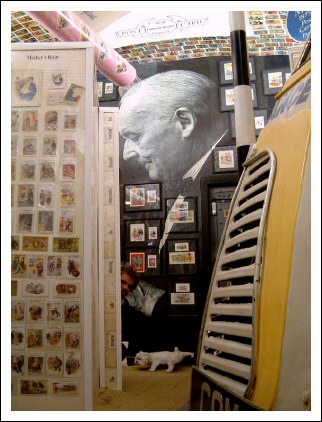
Here Digger
visited The Donald McGill Museum at Ryde on The Isle of Wight
and talked to James Bissell-Thomas, the founder of the museum,
about the great man and about the museum.
Typical saucy McGill material
|
In 1894, British publishers were given permission by the Royal
Mail to manufacture and distribute picture postcards which
could be sent through the mail. Early postcards were pictures
of famous landmarks, scenic views, photographs, lighthouses,
animals or drawings of celebrities and so on. With steam
locomotives providing fast and affordable travel the seaside
became a popular tourist destination. The steam locomotives
generated its own souvenir industry. The picture postcard was,
and is, an essential staple of this industry.
In the early 1930's cartoon style saucy postcards became
widespread and at the peak of their popularity the sale of
saucy postcards reached a massive 16 million a year. They were
often tacky in nature making use of innuendo and traditionally
featured stereotypical characters such as priests, large
ladies and put-upon husbands in the same vein as the Carry On
films.
In the early 1950's, the newly elected Conservative government
were concerned at the apparent deterioration of morals in
Britain and decided on a crackdown on these postcards. The
main target on their hit list was the renowned postcard artist
Donald McGill. In the more liberal 1960's the saucy postcard
was revived and became to be considered, by some, as an art
form.
The demise of the saucy postcard occurred during the 1970's
and 1980's, the quality of the artwork and humor started to
deteriorate with changing attitudes towards the cards content.
Despite the decline in popularity of postcards that are
overtly saucy, postcards continue to be a significant economic
and cultural aspect of British seaside tourism. Sold by
newsagents and street vendors as well as by specialist
souvenir shops. Modern seaside postcards often feature
multiple depiction's of the resort in unusually favourable
weather conditions. These continuously draw tourist to the
seaside. The use of saturated colour and a general departure
from realism have made the postcards of the later twentieth
century become collected and desired by undiscriminating
taste.
Original postcards are now highly sought after and rare
examples can command very high prices at auction.
Donald created over 12,000
postcards from 1904 till his death in 1962.
You will find that Donald's Cards will depict anything and
everyone, his watchful eye never missed a humorous situation
as he witnessed the years as they rolled through the 20th
century. His artwork covers: Two World Wars; Suffragettes;
Lovers; Matrimony; Motoring; Evolution etc. etc.
At the museum, the ceiling has adhered to it over 2,500 of Donald's designs
in chronological order, and amongst this mass of two
dimensional items, you will find several cards which we have
made three dimensional.
The museum also focuses on the trials and tribulations that
Donald experienced in the 1950's, as he was prosecuted under
the 1857 Obscenity Act for producing some cards deemed
unsuitable for the public to see.
It was Donald's use of the Double Entendre or Double Meaning
that the courts disapproved of, despite being a tradition of
the music halls and comics of the day. It is also interesting
to note that a lot of the disapproved cards Donald had made,
he had made earlier versions of in the 1920's and 1930's
without any complaint.
The museum has 1000's of cards on display and also interactive
displays are in evidence. A large collection of original
artwork will also be on display including very early work from
1907-1914.
The beautiful thing about
the Double Entendre is that it is designed to pass over the
head of those who cannot see the alternative meaning,
consequently Donald's cards appear to depict perfectly
innocent situations, and also the text that accompanies them
is equally innocent and often is a known phrase, however there
are hidden meanings to be found if you already know what is
being alluded to.
|
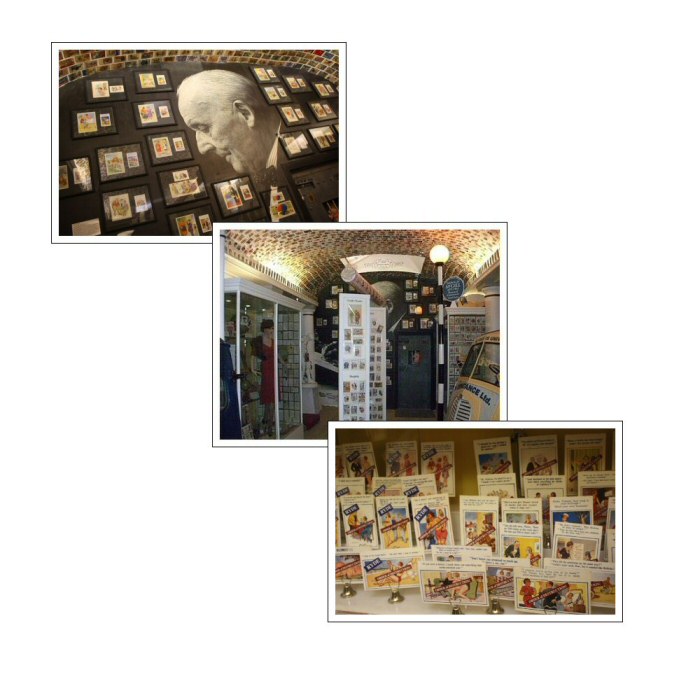
Digger: Please give us your background James and how you got
involved with McGill.
James: I moved my Globe-making
business (www.globemakers.com)
to the Isle of Wight from London. Having enjoyed saucy
postcards in my youth, I purchased a scrapped ship's funnel,
9ft diameter and 23 ft high. It was my intention to re-erect
this in Ryde on the esplanade and to cut a 4 foot door into it
and, after doing this, there would still be 23 feet of linear
wall space for a Saucy Seaside Postcard Museum.
In my research for this
venture, I came across McGill time and time again. He is the
one, crowned in his own lifetime the 'King of The Seaside
Postcard." It soon dawned on me that it should perhaps be a
Museum solely on him. Being protected by copyright, I then
approached the company who owned the McGill Copyright. When I
spoke to them, they informed me that they had gone into
liquidation. On talking to the administrators, I soon found
out that the previous company also owned 3 pallets of
memorabilia as their intention was to open a museum
themselves. Within a year, I had purchased the copyright and
the 3 pallets consisting or rare original artworks, printing
plates, documents and over 120,000 ex-stock postcards in mint
condition. All of this would use far more space than the
funnel, so I decided to use the front end of my Globe Works,
which was destined to become a Globe Museum.
Digger: And also please tell us something about the great
Donald McGill's life and work.
James: Donald was born in 1875,
and in 1904 started making illustrations for the then thriving
postcard industry - it was the email of the day. With up to 7
postal services, you could send a card and receive a reply the
same day! He soon became full-time employed in this industry,
and due to his art training was rightly regarded as one of the
best in his field, in addition to this, he worked in this
industry all his life so his personal output was prolific -
well over 12,000 cards!
Digger: Can you please tell us more about The Donald McGill
Museum, how it started and developed into what it is
today?
James: Upgrading the location
from funnel to Grade II listed building took me longer than I
would have liked. I was over 12 month overdue. However, I hope
this can be seen in the effort made. We have over 2,500
postcards adhered to the ceiling in chronological order,
interactive displays, video footage, an in depth look into the
trials and tribulations Donald suffered when prosecuted in
1954 at an age of 79 years. We also have postcards grouped in
their various categories: Two World Wars, Drunks, Vicars etc.
etc..
Many postcards ended up
being banned
Digger: Please tell us more about what we can see and what is
on offer at the museum.
James: Interestingly enough,
within the museum we have placed 5 fake items. This is to keep
McGill collectors on their toes. It might seem odd that we
have undertaken such a thing, but the V&A has a fakes
gallery, and we will always inform visitors of the fakes if
they cannot find them. There is also a reason why we selected
the item to be affiliated with McGill so that the
documentation provided with the fake will allude more about
McGill and his life.
Digger: What are the holy grails of McGill collecting for your
clients and also for you?
James: The Adult Nursery Tales.
This is a very rare unpublished book from 1910, and immerses
you straight into the murky side of Edwardian life. The 17
superb illustrations depict all manner of subjects: Theft,
Disability, Disease, Infidelity etc. This rare item when it
came up for sale in 1990 at Christies. The surviving McGill
descendants and McGill collectors did not know of its
existence. The under-bidder at the Christies sale values the
17 large illustrations as being worth £1,000- 3,000 each
giving them a value of £20,000 - £50,0000.
Digger: You have amassed a great and impressive collection at
the museum. How have you managed to do this?
James: The 3 pallets helped but
in addition to this we have made significant purchases
including a recent self portrait which the museum recently
purchased for £1500. This self- portrait first started life in
an autograph book, but while others simply left their
signature, Donald, as usual, gave so much more.
Digger: These days things are far from the relatively innocent
times of McGill. What are your thoughts on that?
James: Yes the permissive
society is well and truly here. Donald was prosecuted in 1954
under the 1857 Obscene Publications Act. The essence of this
act was if imagery or text or the combination of both would
pervert the mind of a minor and bring them to adulthood sooner
than should be. However, Donald rightfully used the Double
Entendre and used innocent images and equally innocent text.
It was only if your mind was mature/corrupt or perverse that
you could see a possible second meaning. Consequently, he
should not have been brought to trial and actually went to
trial with every intention of defending his cards. But he was
knobbled by his own defence lawyer who clearly agreed with the
prosecution, and persuaded Donald to accept a guilty plea - he
was 79 years of age and in my view had what today is known as
a senior moment.
As well as his saucy
postcards, McGill was a social commentator and political
satirist -
these postcards would have had him added to a Nazi blacklist
Digger: Why do you think nostalgia is generally so popular
with so many people these days?
James: Life in the present will
always be hard for most of the population. When one looks
back, one focuses on the more positive things, and it will
always appeal due to there being a token of past times.
Digger: And what are your personal favourites from the
collection?
James: In the Donald McGill
(Saucy Seaside) Postcard Museum, out of all of the 1000ıs of
postcards, numerous original artworks, bizarre artefacts
sourced to entertain and amuse, the item I would choose as my
favourite would, without question, be the large black and
white photograph of Donald which covers the entire wall at the
end of the Museum. Prior to my selecting it for the museum, it
had hitherto been unpublished, which is in itself surprising
because the ones that I have seen from the same session
were (in my opinion) far inferior with regard to capturing
Donaldıs essence. The Picture Library states it was taken in
1954. I can only presume that the reason that Picture Post
were photographing Donald at this particular time was because
Donald had made the news due to being prosecuted under the
1857 Obscene Publications Act in Lincoln Quarter Session at
this time.
The year before, it would
appear that the waning do-gooders and possibly the church
orchestrated a witch-hunt against the comic postcard industry,
as they clearly did not approve of some of the cards. Their
complaints to the police, or their local press, which was
enough to instigate the police to act. The result was
thousands of cards being seized in resorts around the country
from Penzance to Grimsby in Ryde alone 5 shops were raided
and of the 5,132 seized, 2,870 were destroyed under an order
of destruction while the same cards continued to be sold in
other towns on the Isle of Wight!
McGill's postcards were in
the great British tradition of pantomime and Carry On movies
It is, therefore, no surprise
that Donald looks so solemn. The world is now on his
shoulders, and, knowing him, this was the last thing he
expected. He is now 79 years old, he lost his wife 2 years
earlier to cancer, and he is now living rent free in one of
his boss's flat (his boss Joseph Asher had invested his
postcard wealth into buying rundown large houses and
converting them into flats.) Donald is living on the first
floor of 36 Christchurch Rd Streatham (AKA St. Reatham). The
house was reported at the time as being structurally unsound
and overcrowded, with coal being heaped outside tenant's doors
in the hall and corridors. He is photographed at his desk in
the bay window, and other photos reveal a large Persian carpet
and Victorian furniture, which was possibly actually purchased
by Donald when Victoria reigned!
The result of the Lincoln Trial
was disastrous for Donald. Despite going to trial with notes
to defend a not guilty plea, the prosecution, because in the
morning sessions two other postcard companies got off lightly,
for this reason they changed the Jury (possibly because the
jury had injured their sides laughing too much at the supposed
"obscene" cards when shown as evidence). The sight of the new
jury, and the prosecution lawyers knobbling Donaldıs defence
lawyer meant that a guilty plea was agreed upon. This, it is
estimated, cost the company the equivalent in todayıs money
of £100,000 from lost revenue of the 21 banned cards (4
immediately and 17 after existing stocks were exhausted) and
the loss of their later revenue and also the shopkeepers who
would no longer buy in future through fear of prosecution.
For me to wish to use the image
in the museum was a task in its own right. Our funds were
limited and we have had no funding or benefactor to assist us
in our aim to make a shrine for this manıs lifeıs work. As a
large image costs more to secure the rights on, I decided to
make a collage, so the rights would be cheaper to attain. By
surrounding Donald with some of his original artworks
(including one of the four banned above the door on the right)
and to ensure that they would not detract by being there, I
ensured that the frames were repainted and the mounts were
reprinted with the photographic data that they were covering.
The result is a semi-transparent illusion which, in my
opinion, does not diminish the gravity of the original photo.
I am sorry that you cannot see
the whole image. Unlike institutional museums and galleries
throughout the land who have unlimited space - I do not.
However if you do come to visit you will be able to see it in
all its glory.
Digger: Who are your 'typical' customers, where are your
customers coming from and what customer
feedback/comments do you get?
James: We get all sorts, but
mostly the older generation who remember the cards. We often
hear loud laughter emanating from the museum and most are
pleased with their visit, we did however have one customer who
tired to get his 40 year son into the museum as a child, he
complained when he left having spent over 30 minutes in the
museum, he later wrote asking for his money back, the address
was from a 2 Million pound house in the suburbs of Kew,
London. His reasons for a refund were so comical ( he thought
the whole museum was just the reception area!) that I asked if
I could come and photograph him and place the correspondence
on our website - but sadly he declined.
Digger: What are the best and most enjoyable aspects of
running The Donald McGill Museum?
James: I think it is the
pleasure in spreading the word about Donald, there is so much
more to him than just Saucy Postcards! He is now getting the
recognition he deserves. It is quite amazing that today you
can buy utter rubbish by the likes of Hirst for hundreds of
thousands of pounds (Hirst has a factory producing so called
"artworks" which even he not contributed towards the items
construction) but an original McGill artwork is sill only
worth about £1000.
Digger: What are your plans for The Donald McGill Museum in
the future?
James: We would like to expand
but we are always juggling - any wealth patrons out there
about to pay too much tax and would like to sponsor us??!!!!!
Digger: Well, having had a tour
around the museum James I have to tell you I'm impressed, with
the humour and creativity of Donald McGill and also with what
you've achieved here. The Donald McGill Museum surely is a
great and fitting tribute to the man but equally a wonderful
place to visit for those who enjoy a good old-fashioned laugh.
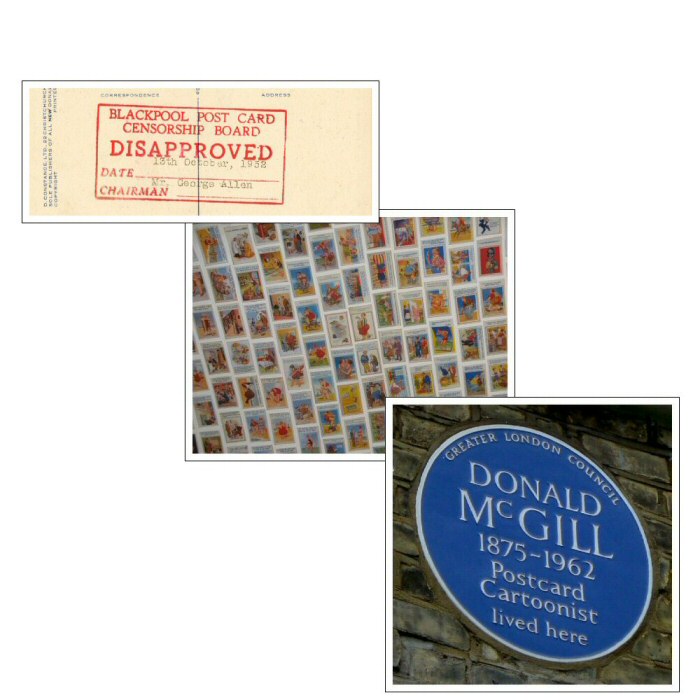
Our museum pays homage to Donald McGill, who spent his life
creating comic artworks for the then thriving postcard
industry
We are located at 15 Union Street, Ryde Isle of
Wight PO33 2DU.
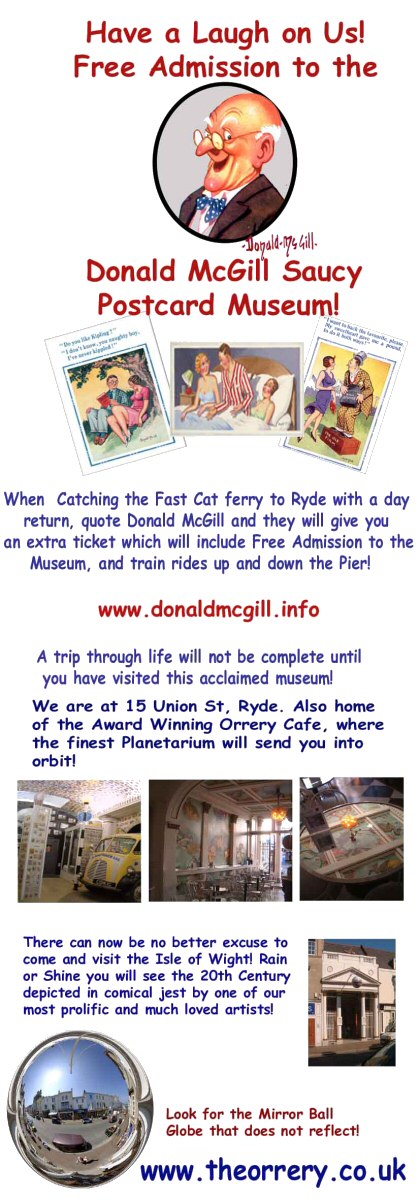
|
|